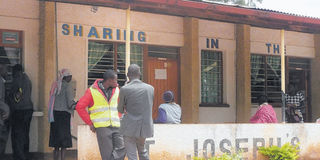Kilgoris hospital struggles to serve residents amidst crisis

Patients waiting to be served at St Joseph’s Mission Hospital in Kilgoris, Narok County. Below: Arrowheads removed from clash victims displayed on a wall in the X-ray department. PHOTO| JOEL REIYA
The two walls of arrowheads, spearheads and shrapnel greet patients who stray to the long closed X-ray department at the St Joseph’s Mission Hospital in Narok County. In its heyday in the 70s, the hospital was a healing sanctuary for victims of clashes that are common in the region inhabited by pastoralists, but not anymore.
When Saitoti Ntukai was shot and injured by suspected warriors from a rival community on September 23 at Esoit, he was rushed to St Joseph’s but doctors there could not remove the bullet lodged in his thigh bone for lack of equipment. He was referred to a hospital in Kisii County.
Started by the Little Sisters of St Joseph in 1963, the facility once had a functional theatre with a competent team of doctors to handle the health emergencies occasioned by intermittent communal violence.
“Whenever a person was shot, he was rushed to St Joseph’s and the arrow or bullet lodged in the body would be removed,” reminisces Peter Naisie, a local elder.
Then things started to fall apart due to among other reasons, mismanagement, insufficient funds, unpaid bills and lack of support. By early 2000, St Joseph’s was “on life support” followed by a steady decline that culminated in its shutdown in 2005. With that went its fully-functional theatre, laboratory, mobile community healthcare programme, Mother and Child Clinic, Traditional Birth Attendant AIDS Education Programme and an arm of Amref’s flying doctors service.
The closure left a population of 170, 591 people in Trans Mara without a proximal hospital and an alternative healthcare provider for services not offered in public facilities.
But having witnessed the anguish of war victims and patients, then Father-in-charge San Sankale, who is now based at Enoosupukia in Naivasha, resolved to bring the hospital back to its feet. He lobbied intensively to convince a management wearied by the hospital’s seemingly endless woes to revive it.
“My resolve was strengthened after watching two women die of pregnancy complications because no other hospital offered Caesarian sections at the time and the nearest referral hospitals – Tenwek and Kabianga – were more than 200 kilometres away, Fr Sankale told Healthy Nation on phone.
Three years later, the 2007/08 post-election violence broke out and many health centres were overwhelmed with the number of casualties.
“People were shot at Ang’ata and Shartuka and that jolted us to revive the hospital, well-known for offering emergency services to war victims,” said Fr Sankale.
Though the hospital doors reopened, it is a pale shadow of its former self. Bed capacity fell from 200 beds in 1980 to 120 beds, and its once famed X-ray department is grounded for lack of a radiographer. Though the hospital received Sh2 million from the National Hospital Insurance Fund between May and August this year, that was just half of what it needed to cover costs during that period.
As the nurses’ strike bites, patients have flocked the hospital in search of care, adding to the influx of victims of the recurrent clashes. This has brought to the fore the glaring lack of adequate health facilities in the Trans Mara region that includes Esoit, Pimbinyiet, Olmelil, Magena, Masurura and Olereko.
In light of the dire circumstances under which the reopened hospital operates, the hospital has instituted measures such as requiring patients without health insurance to pay a deposit of Sh3,000 before they are admitted or offered treatment.
“This reduces cases of patients defaulting on payment or failing to honour pledges to pay hospital bills,” said Father Ngure, adding that this does not apply to any emergency care and treatment.


